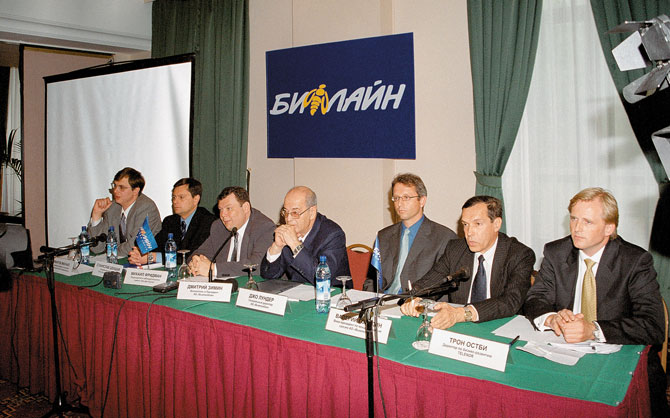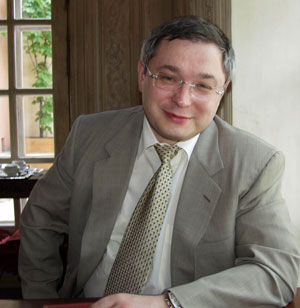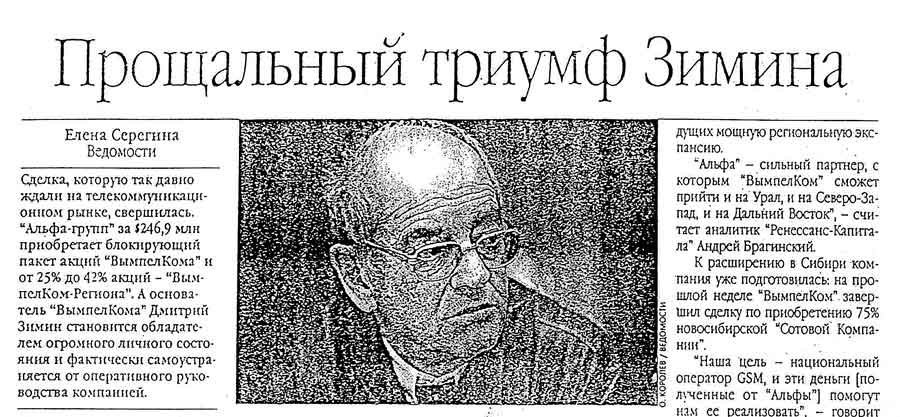This office was located (and maybe still is) in Spasonalivkovsky Pereulok, where MPSS used to be – Ministry of Communications Industry. By the way, it was responsible for all radio-measuring equipment and was part of the famous nine ministries that formed the Military-Industrial Complex of the USSR. I got to visit it while pushing through the measuring equipment that we needed at RTI, and trying to make happen yet another decision by the MIC. I remember how, together with the chief engineer of the Vilnius 50th Anniversary of October plant, Chorny (a very pleasant and smart man, but unfortunately I can’t recall his name), I languished for half a day in the reception room of a mid-level boss named either Spitsin or Sinitsin. Chorny suggested to this boss’ secretary that she plant a pear tree in the reception room – in order to have something to shake down. It was at this very plant back in the Perestroika years we launched production of our conversion equipment for satellite TV reception. And the director of this 50th Anniversary of October plant was Osipovich Burdenko. Later he turned out to be an ardent supporter of GKChP, and subsequently was compelled to flee Vilnius. Oh, well, where are you now, comrade Burdenko, where are you now, comrade Chorny! I would have loved to down a glass or two with you and have a good chat.
When all your life, already quite long, passes in the same town, many of its areas and buildings bring an involuntary stream of memories, altogether disconnected from the current events.
And now we are at GGSN.
All of the above is an introduction to the as yet unwritten by me history of the frequency scandal.
The papers dubbed it the “frequency scandal” (the overview of the press on the subject you can find in the Appendix), the story of the attempts by the officials from the Communications Ministry to take away frequencies from VympelCom and MTS and give them instead to the new company Sonic Duo, the predecessor of MegaFon. The Ministry loved (and maybe still loves) this company as only a mother can love her child. Megafon was the only carrier that got a license for the whole country. The scandal drew in not only members of our government, but members of some foreign governments as well. And it was that session at GGSN, mentioned at the start of this chapter, which marked the beginning of the scandal.
I’m trying to explain to myself why I’m having so much trouble telling the story of the frequency scandal, one of the most dramatic episodes in the history of VympelCom:
- I am reluctant to publicly name the officials directly responsible for it, probably for the same reasons the names of victims of rape usually are not made public. It seems to me that the moral decay which consumes the rank and file of bureaucratic structures, as they are forced to defend the private interests of their superiors, is one of the sad aspects of our reality.
- I failed to portray the behavior of the senior official, the one who initiated the frequency scandal and corrupted his subordinates. The reason for this behavior was probably that a businessman-official who is charged with regulating the market that includes his own business, inevitably ends up in the position of a goat watching over the cabbage patch. I lost any desire to depict the morals and actions of such a goat. As for the goat’s owner, who ordered the goat to watch the cabbage – I am keeping him out of my memoirs altogether. I’m not acquainted with him.
Another reason for my reserve in describing the frequency scandal is in the gradual transformation of my initial enmity towards its initiator into a certain feeling of gratitude and appreciation. With this story, he had made my decision to resign in May of 2001 easy and joyous. People close to me know that when I raise a toast to the joyful events of my life and to thank many people involved, I never fail to include this official.
One of these toasts was heard by Mikhail Fridman, who hastened to remark that he fully agreed, for if not for this episode, his lucrative for his Alpha purchase of a large number of VympelCom shares would not have been possible.
I don’t know, I don’t know, anything’s possible…
This photo is from the press conference after the VympelCom-Alpha deal (May of 2001). Mikhail Fridman is second from left, smiling. To the right of him is Stanislav Shekshnya; by then he was already working not at VympelCom, but at the Alpha Group. At the far right is Mikhail Umarov, our press secretary. I once lured him to VympelCom away from Kommersant. And the sign in front of me says: “Founder and President of AO VympelCom.” A few days would pass, I would resign, and my sign would then have only one additional word: “Founder and Honorary President of AO VympelCom.”

Telenor, which then was at war with Alpha, in 2000 having precluded itself from investing in VympelCom-Region, in practice encouraged my contacts with Alpha and the emergence of this major shareholder of VympelCom.
For some reason, the main negotiator from Alpha was absent from this press conference. I wouldn’t wish it on my worst enemy to have such a negotiator across the table. It is rumored that it had been one of the most lucrative deals in the history of Alpha. Amazingly, even I was satisfied. This deal marked the fundamental change in my life and the beginning of its final, and as it turned out, also very interesting stage.

I made public my resignation on May 31, 2001.
It is rumored that upon learning of my resignation, one of the orchestrators of the frequency scandal, free-lance Consultant and Strategist (how he liked calling himself), whose office was next to the office of the Minister himself, expressed a thought that was immediately brought to my attention: “It’s a good thing that Zimin left. And we will fix a deal with Alpha in no time…” Oh, well…
And what happened next? This is of little concern to me. As far as I know form the newspapers, this engaging and passionate activity – the war over Sonic Duo (pardon me, over Megafon) – took on an almost global character and is still raging. The news reports from the front feature the names of Minister Reiman and Leonid Rozhetskin. And they are fighting on opposite sides. And I knew them as comrades in arms…
As for me, I don’t like fighting wars. It always seemed to me that was (as opposed to competition) and business are hardly compatible.
So, those who are curious may take their seats on the bleachers. I, for one, belong on the couch.
Happiness to all.




